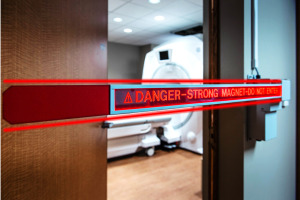by
Lauren Dubinsky, Senior Reporter | September 20, 2021

The TechGate from Aegys prevents people from wandering into the MR suite
From the September 2021 issue of HealthCare Business News magazine
The MR world is in a bit of a conundrum. Providers are ramping up scan volumes to make up for missed exams (and miss revenue) during the lockdown phase of the pandemic, yet the U.S. is currently experiencing a shortage of technologists.
If you do a search on the internet job board Indeed for MR technologist openings in the country, almost 4,000 positions will appear. The staffing shortage is so severe that some healthcare facilities are offering sign-on bonuses of up to $15,000 to attract experienced MR technologists.
Lisa Thornhill, a medical physicist at West Physics, a provider of diagnostic medical and health physics consulting and testing to healthcare organizations, and MR technologist at a level-one trauma center at a large hospital in Boston, is on the frontlines of this issue.



Ad Statistics
Times Displayed: 16169
Times Visited: 33 Final days to save an extra 10% on Imaging, Ultrasound, and Biomed parts web prices.* Unlimited use now through September 30 with code AANIV10 (*certain restrictions apply)
“The main thrust right now appears to be to drive volume to catch up with some of the lost revenue from last year,” she explained. “All of us collectively in the MR world working as technologists, managers and observing as physicists are seeing this as a potential MR safety issue.”
According to Thornhill, they collectively view this as a major MR safety issue. Many technologists left the practice last year to retire or semi-retire and in order to compensate for the shortage, facilities are aiming to increase technologists’ scope of practice.
“Technologists are concerned with the clinical safety issue of being asked to monitor sedation patients when nursing personnel are not available,” said Thornhill. “Both technologists and nursing staff feel that they are often physically and emotionally exhausted and therefore, very reluctant to take on more responsibilities that could endanger patients due to limited resources and staffing.”
Fortunately, there is an online network of support to help technologists with these complex cases that they may not have come into contact with before. According to Thornhill, social media has provided some of the greatest advances in MR safety to meet the needs of the moment.
Among those online communities is MRI Safety, a Facebook group founded by Tobias Gilk, former chair of the American Board of Magnetic Resonance Safety (ABMRS) and a recognized leader in MR safety, that many MR technologists have found helpful. The group is made up of 25,000 members and it’s a place for technologists to ask questions and get feedback and advice from the MR community. The questions can range from concerns about active implants to how to set up certain protocols.

